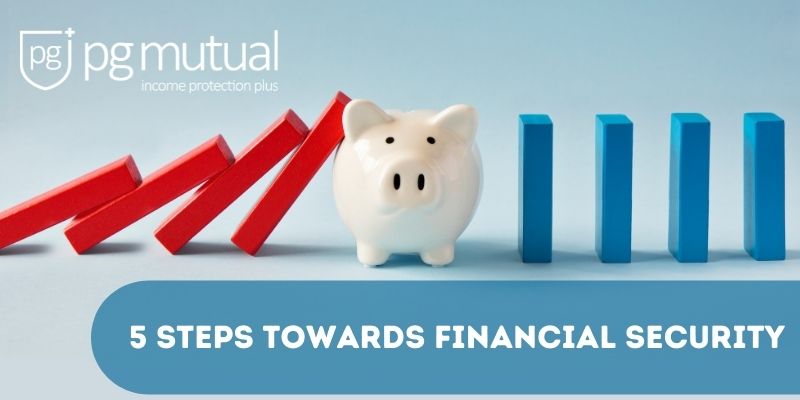5 Steps Towards Financial Security

Financial security: it’s one of the most crucial ingredients in the recipe for peace of mind. The idea that you’ve planned for the future can make the present twice as comfortable.
In a post-Covid world, we are more aware that job security is rarely certain. But that doesn’t mean financial security is totally off-limits. Take these steps to make your money work harder for your future.
1. Assess your collateral
List your incomes. Tally up your outgoings. Compile an inventory of all your assets. Just looking at the bare facts can be an eye-opener for many and reveal what you’re sitting on. Your car, mortgage, pension, savings – tot up the lot and be realistic about their value.
Why do this? Because you’re planning for your future. Post-retirement, you may be seeking to downsize, freeing up the equity in your home to live on comfortably. Your assets are the tangible result of your hard-worked life, so take a good look at what you’ve got to play with.
While you’re at it, perhaps you have an unused Stradivarius taking up room in your home that could be put to better use in your savings account? We’re not suggesting you throw your entire family’s heirloom collection on eBay, but there’s potentially a case to be made for realising when something could be gathering interest in your account rather than dust in the loft.
2. Prioritise paying off debt
You owe money, and it needs to be paid back. That’s the bottom line. The more you owe, the longer that the money you’re earning isn’t your money. So try to make things a little easier on yourself and your bank balance by concentrating on crushing that credit card to a cloud of fine dust. If you’re drowning in debt, taking control of this is the single most important financial decision you can make. Consider a 0% balance transfer on that credit card or a consolidation loan, so you’re clearing the balance, not just interest. Many cards, particular store cards, have wallet-punishing high APRs. Consequently, with every payment, you’re barely reducing your debt instead of paying for the privilege of owing money.
It’s worth speaking with the bank to see if a consolidated loan could get your monthly payments into a manageable chunk to chip away more tangibly at your debt. Once you’ve got a handle on your creditors, you’re in a much better position to start saving.
3. Talk to a financial adviser
Get an expert in and let them help you. Even a single session could provide you with a roadmap to financial security – helping your income breathe more easily and freeing up your finances like you didn’t think possible. The first session from some may be free, so shop around for a financial adviser you feel comfortable with. Ask friends and family for recommendations (most rely on good local connections and word of mouth) or go to a directory.
Be clear about what you want out of the meeting and have a set of achievable goals for your future. It’s all about planning. When do you want to retire? How much can you realistically live on? Have any burning desires to caravan around the globe and need to budget for it? Let a professional advisor work with you to help crystalise your objectives and make achieving them more realistic.
4. Shop wisely
We’re not teaching you to suck eggs. Just protect your nest egg. By saving now, you’re future-proofing your finances, given you more to put aside for your retirement. With websites such as ShopZilla and supermarket apps like Trolley, it could be so easy to get into a money-saving mindset.
5. Consider income protection
Unless your parents owned a diamond mine or you were born into nobility, the number one way money makes its way into your bank account is for you to earn it. So, it makes sense to guard that income vigilantly. Life has a habit of throwing a curveball: an injury or illness that threatens to sever your income. Those unexpected upsets throw your bank balance and life choices off target. Being one payday away from making the rent can be a terrifying prospect.
Income protection is a type of insurance policy that can provide a replacement income should you lose yours due to illness or injury. You pay a relatively small monthly premium, and if you’re unable to work due to illness or injury, you could receive an income from your insurer until you either sufficiently recover or, in more serious cases, reach the retirement age of the policy. And when you take out income protection with PG Mutual, our product includes a profit share scheme that helps you to build an additional sum for your future.
Find out more and get a quote at pgmutual.co.uk
Go Back